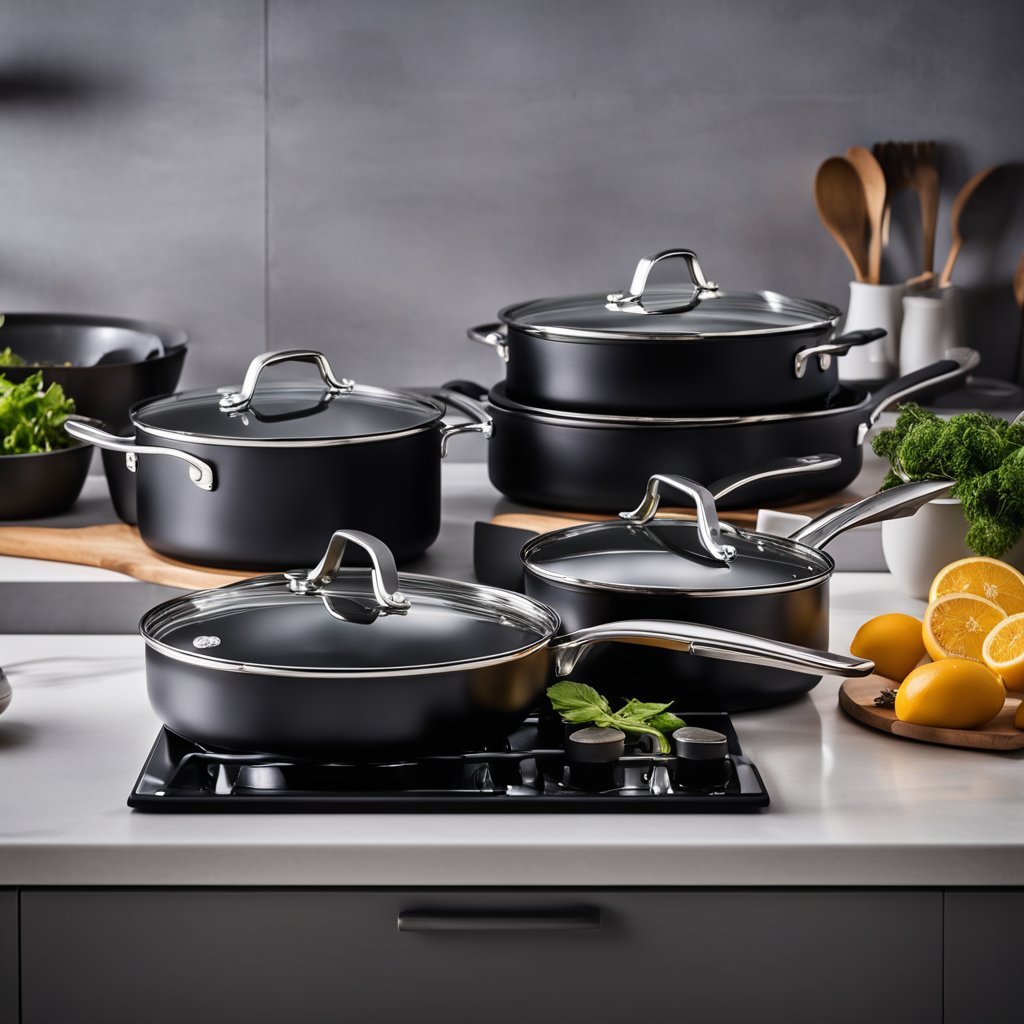This post contains affiliate links. See the affiliate disclaimer here.
Are you considering using granite cookware but wondering about its safety? Granite cookware has gained popularity for its durability and non-stick properties. However, there are concerns about the safety of using granite cookware due to the materials used in its production.
When it comes to determining if granite cookware is safe for your kitchen, it’s essential to understand the potential risks and benefits.
By exploring the safety aspects of granite cookware, you can make an informed decision about whether it’s the right choice for your cooking needs. Let’s delve into the details to help you navigate the world of cookware safety.
Key Takeaways
- Granite cookware is made by coating metal pans with a non-stick material infused with granite particles.
- Safety concerns revolve around potential unknown chemicals in the non-stick coating and risks of overheating.
- Look for granite cookware with FDA approval or PFOA-free certifications for safer options.
- Proper maintenance, avoiding overheating, and careful handling can help maintain the safety of granite cookware.
- Consider potential risks like unknown chemicals, overheating concerns, scratching wear, maintenance issues, and allergies when using granite cookware.
- Benefits of granite cookware include durability, non-stick properties, heat distribution, easy cleaning, aesthetic appeal, and a variety of options.
Understanding Granite Cookware
When it comes to granite cookware, it’s essential to understand its composition. Granite cookware is made by coating aluminum or other metal pans with a layer of PTFE-free non-stick material infused with granite particles. This coating gives the cookware a granite-like appearance while providing a non-stick surface for cooking.
Granite cookware is praised for its durability, resistance to scratching, and even heat distribution. However, the use of unknown chemicals in the non-stick coating raises concerns about its safety. While manufacturers claim their products are PFOA and PFOS-free, there may still be trace amounts of other potentially harmful substances.
To ensure the safety of your cookware, look for certifications such as FDA approval or PFOA-free certifications. Avoid overheating your granite cookware, as this can cause the non-stick coating to break down and release harmful fumes. Hand washing your cookware is recommended to maintain its longevity and prevent wear and tear on the non-stick coating.
Understanding the benefits and risks associated with granite cookware is essential in making an informed decision for your kitchen. By being aware of the materials used and following proper care instructions, you can enjoy the convenience of non-stick cooking while minimizing any potential safety concerns.
Materials Used in Granite Cookware Production
Granite cookware typically consists of a non-stick material infused with granite particles that is applied to metal pans. The non-stick coating in these pans is what sets them apart, making them easy to cook with and clean. It’s crucial to note that the non-stick coating found in granite cookware may contain unknown chemicals, posing potential health risks when heated to high temperatures.
Manufacturers often tout granite cookware for its durability and heat distribution properties, making it a popular choice for many home cooks. However, it is essential to exercise caution when using these pans to prevent unwanted chemical exposure. Some manufacturers have started to address these concerns by seeking certifications such as FDA approval or ensuring their products are PFOA-free to provide consumers with safer options.
Before purchasing granite cookware, it’s advisable to research the materials used in the production process and opt for brands that prioritize safety and transparency in their non-stick coatings. Understanding the composition of your cookware can help you make informed decisions about its safety and suitability for your cooking needs.
Potential Risks of Using Granite Cookware
When considering the safety of granite cookware, it’s essential to be aware of some potential risks associated with its use. Here are a few points to keep in mind:
- Unknown Chemicals: Granite cookware’s non-stick coating may contain unknown chemicals that could pose health risks when exposed to high temperatures. It’s crucial to research the materials used in the manufacturing process to understand any potential hazards.
- Overheating Concerns: Heating granite cookware excessively can lead to the release of harmful fumes. Be sure to follow the manufacturer’s guidelines regarding safe temperature limits to avoid any risks associated with overheating the cookware.
- Scratching and Wear: While granite cookware is known for its durability, excessive scratching or wear on the non-stick coating can lead to potentially harmful substances leaching into food. It’s important to handle the cookware with care to maintain its safety.
- Maintenance Issues: Improper cleaning and maintenance of granite cookware can also pose risks. Harsh cleaning agents or abrasive materials can damage the non-stick surface, potentially exposing you to harmful substances during cooking.
- Potential Allergies: Some individuals may be allergic to certain components used in granite cookware production. If you have known allergies or sensitivities, it’s advisable to check the materials used in the cookware and consult with a healthcare professional if needed.
Stay informed about these potential risks to ensure the safe use of granite cookware in your kitchen.
Benefits of Granite Cookware
When considering granite cookware, you’ll find several advantages that make it a popular choice:
- Durability: Granite cookware is known for its durability, being resistant to scratches, chips, and cracks.
- Non-stick Properties: Enjoy cooking with little to no oil thanks to the non-stick surface of granite cookware.
- Heat Distribution: Granite cookware provides even heat distribution, ensuring your food is cooked consistently.
- Easy to Clean: Cleaning granite cookware is a breeze, often requiring a simple wipe down with a soft sponge.
- Aesthetically Pleasing: With its elegant look and stylish design, granite cookware can enhance the appearance of your kitchen.
- Variety of Options: Granite cookware comes in a range of sizes and styles to suit your cooking needs.
Incorporating granite cookware into your kitchen can offer you these benefits, but it’s important to also be aware of any potential risks associated with its usage.
Making an Informed Decision
When it comes to deciding whether granite cookware is safe for your kitchen, it’s essential to weigh both the benefits and potential risks. Here are some key points to consider to make an educated decision:
- Safety Concerns: While granite cookware is generally safe to use, there have been some debates about the safety of the non-stick coating used in some products. Be sure to research the specific brand and type of cookware you’re considering to understand any potential risks.
- Proper Usage: To ensure the safety of granite cookware, it’s vital to follow the manufacturer’s guidelines for proper usage and maintenance. Avoid overheating the cookware or using metal utensils that can scratch the surface and compromise its safety.
- Quality Matters: Investing in high-quality granite cookware from reputable brands can help mitigate safety concerns. Look for products that are free from harmful chemicals such as PFOA and PTFE, which can pose health risks when exposed to high heat.
- Regular Inspection: Periodically inspect your granite cookware for any signs of wear and tear. Discard any cookware that shows signs of chipping, peeling, or scratching to prevent potential health hazards.
- Alternative Options: If you have concerns about the safety of granite cookware, consider exploring alternative cookware materials such as stainless steel, cast iron, or ceramic, which offer similar benefits without the potential risks associated with non-stick coatings.
- Consult the Experts: When in doubt, don’t hesitate to seek advice from culinary experts, health professionals, or reliable sources to make an informed decision about the safety of granite cookware in your kitchen. Your safety and well-being should always come first.
Conclusion
Granite cookware can be a safe and beneficial addition to your kitchen. With its durability, non-stick properties, even heat distribution, and easy cleaning process, it offers a range of advantages.
By being mindful of safety concerns, proper maintenance, and quality, you can enjoy the benefits of granite cookware while ensuring a safe cooking environment.
Remember to regularly inspect your cookware for wear and tear, explore alternative materials if needed, and seek advice from experts when in doubt. With the right precautions and care, you can confidently use granite cookware to enhance your cooking experience.
Frequently Asked Questions
Is granite cookware a good option for cooking?
Yes, granite cookware is a great choice because it is durable, distributes heat evenly, easy to clean, and offers a non-stick surface for cooking various dishes.
How do you ensure safety when using granite cookware?
Ensure safety by using high-quality granite cookware, inspecting for wear and tear regularly, following proper usage guidelines, exploring alternative materials if concerned, and consulting experts for advice when needed.
What are the benefits of using granite cookware?
Benefits include durability, non-stick properties, even heat distribution, easy cleaning, aesthetic appeal, and a wide range of options available to suit different cooking needs.
Why is it important to prioritize safety when choosing cookware?
Prioritizing safety is crucial to prevent potential health risks associated with cookware materials and ensure a safe cooking environment for you and your family in the kitchen.

